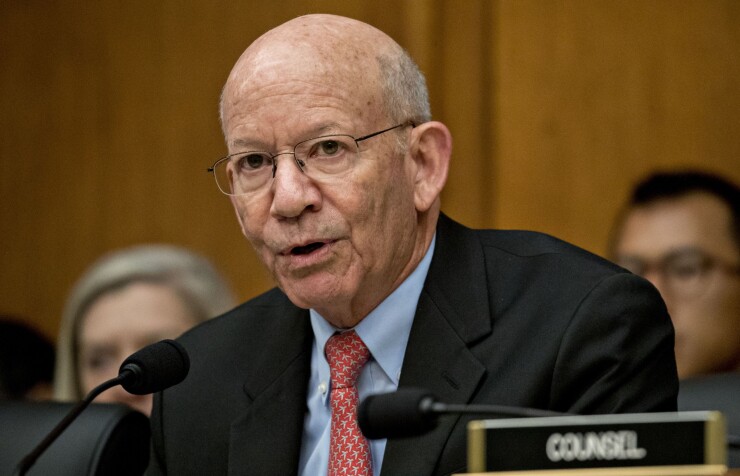
House Transportation and Infrastructure Committee Chairman Peter DeFazio released a five year, $494 billion surface infrastructure and rail proposal Wednesday that does not have bipartisan support.
The bill, called the Invest in American plan, also does not have the tax provisions sought by the municipal bond industry because that’s the jurisdiction of the House Ways and Means Committee which will have to come up with a way to pay for the bill.
Public finance groups, however, expressed hope Wednesday that the bill’s introduction paves the way for consideration of bond provisions.
DeFazio, D-Ore., who said he will formally introduce the bill Thursday, has scheduled it for committee consideration on June 17.
Although Rep. Sam Graves of Missouri, the ranking Republican on the panel, is not a cosponsor, DeFazio told reporters he is giving Republicans two weeks to propose amendments that will result in legislation.
“I hope it will come out of the House bipartisan,” DeFazio said. He noted that the previous surface transportation bill started out as a bill written by Republicans, who were then in the majority, and marked up in committee two days later with the end result being bipartisan.
Earlier this year House Democrats released a larger infrastructure framework of $760 billion over 5 years. It would restore Build America Bonds and advance refunding for municipal bonds. The framework also would expand qualified private activity bonds, reinstate tax credit bonds, impose an undetermined increase in airport passenger facility charges and authorize $40 billion more for state revolving funds that finance water projects.
The Bond Dealers of America issued a statement Wednesday saying it is “actively working with Congress and hopeful that there will be an opportunity to consider bond provisions, such as bank qualified bonds and municipal advance refundings in the context of the overall bill.”
Michael Belarmino, senior policy advisor at the Government Finance Officers Association, said his organization is “just happy to see that they are still moving forward.”
To address the emergency situations communities face because of the COVID-19 pandemic, the first-year spending of $80 billion in the Invest in America Act would not require a local match and would be 100% federally funded, DeFazio said.
As to whether the House considers the surface transportation bill separately or in conjunction with other infrastructure measures such as wastewater and broadband, DeFazio said that wasn’t his decision to make.
“It’s ultimately up to my leadership, the total construct that moves forward,” he said.
The Senate Environment and Public Works Committee unanimously approved a bill last July to authorize $287 billion in federal surface transportation spending over five years. Other Senate committees with jurisdiction over transit, rail, and safety issues have yet to act.
The bipartisan Senate bill, S. 2302, America’s Transportation Infrastructure Act of 2019, directs just over 90% of the overall authorization, $259 million, to formula aid for state highway programs.
The Senate Finance Committee also has not taken up how to pay for the legislation.
The U.S. Chamber of Commerce on Wednesday criticized the House Democrats’ bill.
“This is no time for another partisan approach to infrastructure,” said Neil Bradley, the chamber’s executive vice president and chief policy officer. “The Senate Environment and Public Works Committee produced a bipartisan bill that drew unanimous support. We stand ready to work with Democrats and Republicans in the House and Senate to move a bipartisan bill the president can sign into law that would revive our nation’s infrastructure.”
The American Association of State Highway and Transportation Officials likewise said it was “disappointed" the bill is not bipartisan.
The proposed House Democrats bill includes policies to shore up revenue for bond-financed projects.
The bill addresses the shortfall in gasoline tax revenues that have led to a shortfall in the Highway Trust Fund by nearly doubling funding for Vehicle Miles Traveled pilot programs across the country, encouraging states to begin implementing successful VMT programs. It also establishes a national VMT pilot program, including both passenger and commercial vehicles, to help develop a sustainable funding mechanism for the surface transportation system.
DeFazio suggested that the shortfall -- which he estimated at $138 billion -- be addressed by selling 30-year bonds.
“I would suggest that for the term of this bill we make interest-only payments, which would be a very small amount of additional funds needed,” DeFazio said, noting that policy decision is the jurisdiction of the Ways and Means Committee.
At the end of the 5 years of the new surface transportation bill, DeFazio said the nation would be prepared to replace the gas tax with vehicle miles traveled. “And we could begin to pay down the principal balance because this will generate such tremendous economic activity,” he said.
As for the proposal released Wednesday, projects financed under the Transportation Infrastructure Finance and Innovation Act that is known as TIFIA would have streamlined rules for approval because the threshold would be raised under which projects are required to secure multiple credit rating agency opinions.
It also would clarify that the proceeds of a secured loan under TIFIA shall be considered part of the non-federal share of a project if the loan is repayable from non-federal funds.
Territories such as Puerto Rico also would be allowed to use funds made available under this section for the non-federal match under the TIFIA.





